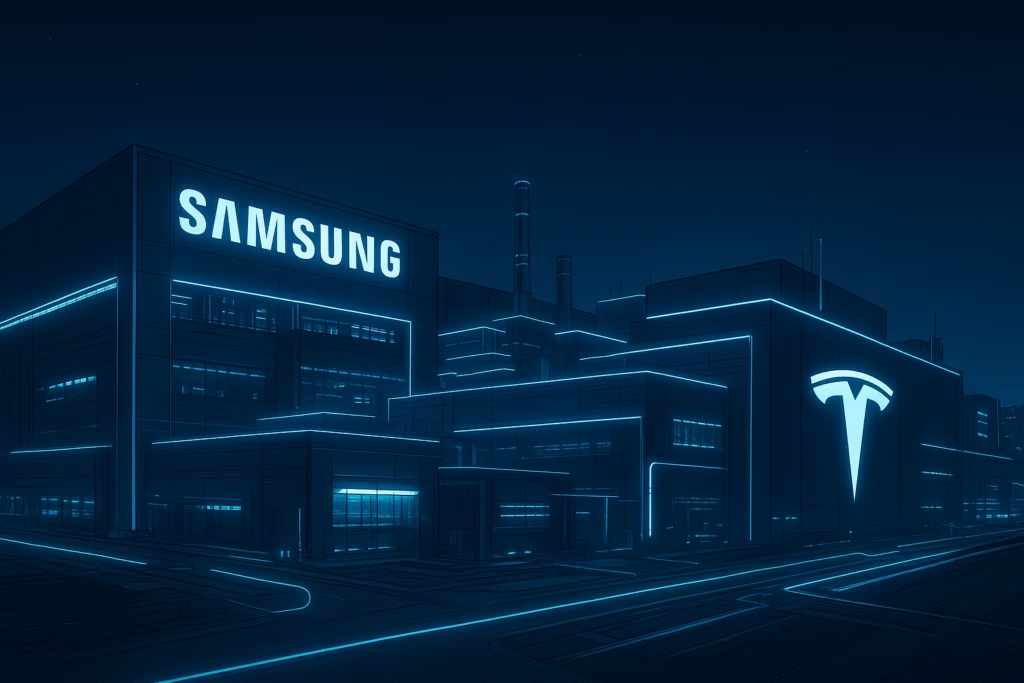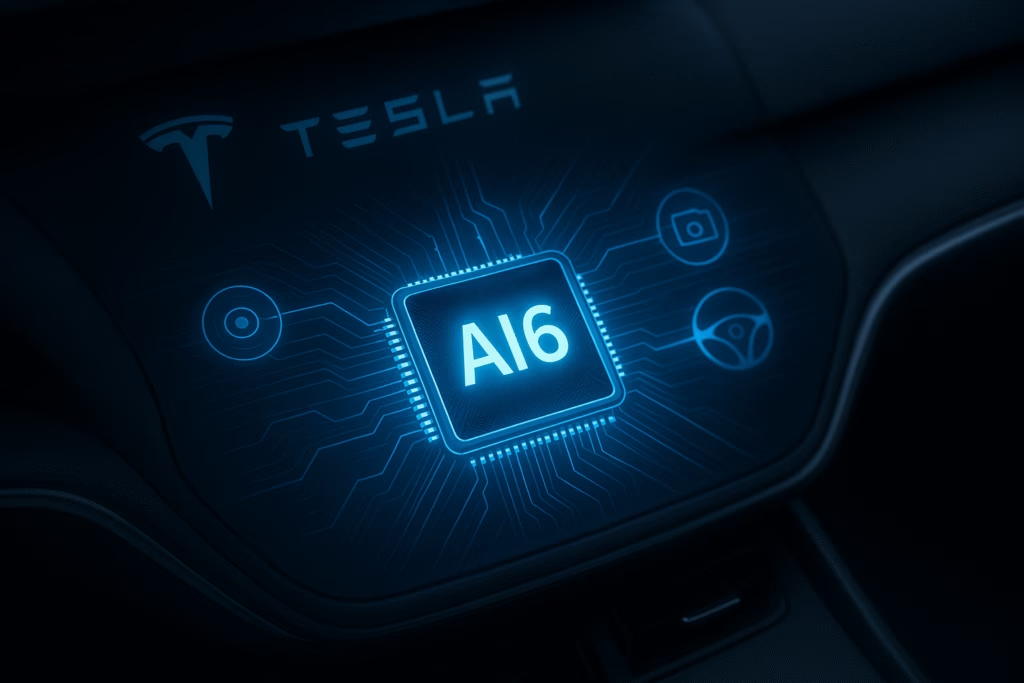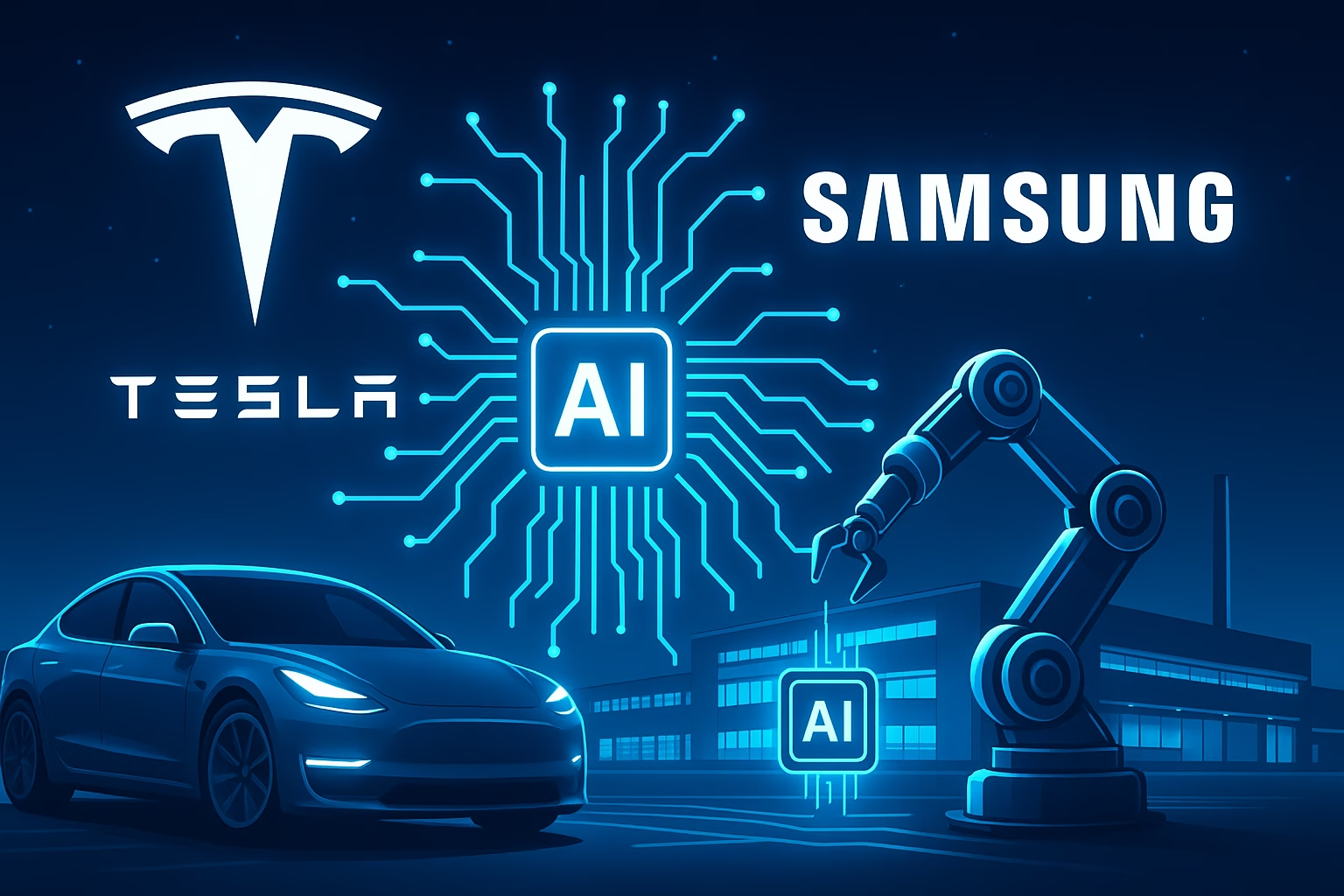Table of Contents
Introduction
Tesla has always positioned itself as more than just an automaker—it’s a technology company reshaping mobility and artificial intelligence. Recently, Tesla announced a historic $16.5 billion chip manufacturing deal with Samsung to produce its custom AI6 chips. These chips are set to power Tesla’s autonomous vehicles and humanoid robots, cementing its role as a global leader in AI hardware.
This landmark deal marks a strategic shift away from TSMC to Samsung’s Texas-based fabrication plant, leveraging the U.S. CHIPS and Science Act to secure local production, reduce foreign dependency, and strengthen America’s semiconductor ecosystem.
Tesla Samsung AI6 Chip Deal: Why It Matters
The Tesla Samsung AI6 chip deal is more than a business transaction—it’s a technology-defining partnership. At its core, this $16.5 billion agreement represents Tesla’s commitment to building its own AI ecosystem by controlling the most critical component of autonomous driving and robotics: semiconductors.
By designing proprietary AI6 chips and partnering with Samsung for production, Tesla ensures maximum performance, efficiency, and scalability. Unlike generic chips, these custom-built semiconductors are optimized for AI workloads, enabling faster decision-making for Tesla’s Full Self-Driving (FSD) systems and advanced robotics.
This partnership highlights Tesla’s long-term vision: a synergy between electric vehicles, artificial intelligence, and robotics—all powered by in-house chip technology.
Tesla’s Journey to Custom AI6 Chips
Tesla’s evolution toward in-house semiconductor design was inevitable. Its Autopilot and Full Self-Driving (FSD) systems rely on increasingly complex AI algorithms that demand unparalleled computing power. Off-the-shelf chips could no longer deliver the performance Tesla required.
Thus, Tesla developed the AI6 chip, a breakthrough in custom silicon engineering. These chips are specifically designed to handle autonomous driving, neural network training, and humanoid robot intelligence. By shifting to the AI6 chip, Tesla gains a strategic edge in efficiency, power optimization, and faster AI inference—critical for safety and real-time decision-making on the road.
The Tesla Samsung AI6 chip deal secures the future of this innovation by scaling production for mass adoption.
Why Samsung Over TSMC? The Strategic Supplier Shift

Given that TSMC is a world leader in semiconductor fabrication, Tesla’s initial reliance on the company made sense. Nonetheless, the decision to switch to Samsung, namely its manufacturing plant in Texas, indicates Tesla’s desire to diversify its supply chain and localize production.
Tesla accomplishes three strategic objectives by shifting chip manufacturing to Samsung’s U.S.-based facility:
- Supply Chain Security – Avoids geopolitical risks tied to overseas production.
- Government Incentives—Takes advantage of the U.S. CHIPS and Science Act, which supports domestic semiconductor projects.
- Faster Innovation Cycles—Close collaboration with Samsung allows Tesla to push rapid iterations of its AI6 chip designs.
This bold shift underscores how the Tesla-Samsung AI6 chip deal represents not just technological progress but also supply chain resilience.
U.S. CHIPS Act: Fueling Tesla and Samsung’s Partnership

The Tesla-Samsung AI6 chip transaction is heavily influenced by the U.S. CHIPS and Science Act. In order to lessen reliance on foreign suppliers, this legislation encourages semiconductor businesses to set up manufacturing facilities in the United States.
These incentives are directly related to Samsung’s choice to construct a cutting-edge semiconductor factory in Texas. By securing a dependable, U.S.-based production pipeline for its most cutting-edge chips, this relationship benefits Tesla’s industrial competitiveness and national security.
In addition to protecting its AI future, Tesla is advancing America’s larger objective of becoming a worldwide semiconductor powerhouse by utilizing the CHIPS Act.
AI6 Chips: Powering Tesla’s Future in AI and Robotics
The AI6 chip is designed as the beating heart of Tesla’s most ambitious projects. It is built to handle complex AI workloads, from autonomous vehicle navigation to humanoid robotics.
Key benefits of AI6 chips include:
- High-Performance AI Processing – Faster neural network training and real-time inference.
- Energy Efficiency – Optimized for EVs and robotic applications where power management is crucial.
- Scalability – Designed to support Tesla’s growing fleet and future robotics ecosystem.
In short, the Tesla Samsung AI6 chip deal ensures Tesla’s continued leadership in developing AI-driven solutions that integrate seamlessly across cars, robots, and potentially other smart devices.
Elon Musk’s Vision: Beyond Cars into AI
Elon Musk has stated unequivocally that his goals for Tesla go beyond automobiles. This goal is accelerated by the Tesla-Samsung AI6 chip agreement, which provides Tesla with the hardware framework to investigate AI on a large scale.
Although human oversight is still necessary for Tesla’s FSD system, the AI6 chip will bring autonomy closer to reality. Additionally, Musk envisions humanoid robots that are powered by AI, with the AI6 chip acting as their cognitive engine.
This fits with Musk’s larger plan, which aims to make Tesla a cutting-edge AI business in addition to an automobile manufacturer. One important step in that direction is the AI6 chip.
Challenges of Advanced Semiconductor Manufacturing
The Tesla Samsung AI6 chip agreement is fraught with difficulties, despite its potential. The process of constructing a semiconductor factory takes several years and calls for billions of dollars, skilled workers, and sophisticated infrastructure.
There is a significant learning curve while increasing production, even after building is complete. Tesla’s AI6 chip roadmap may be impacted by delays or production problems, which might limit the adoption of autonomous technology.
However, government legislation and Tesla and Samsung’s strategic alliance offer tremendous momentum to overcome these obstacles.
Global Implications of Tesla Samsung AI6 Chip Deal
The Tesla Samsung AI6 chip deal is not just about Tesla. It has ripple effects across the global automotive, semiconductor, and AI industries.
- For Automakers: Tesla sets the precedent for in-house chip design, pushing others to follow suit.
- For the Semiconductor Industry: The partnership drives innovation in custom AI chips, fueling competition among major fabs.
- For Global Tech Leadership: By localizing production, Tesla strengthens America’s role in the semiconductor race, countering reliance on Asian supply chains.
This deal could become a catalyst for industry-wide transformation, accelerating the global shift toward AI-optimized hardware.
Scalability and Growth Potential
Elon Musk hinted that production volumes of the AI6 chip may exceed initial expectations. This scalability reflects Tesla’s anticipation of massive demand—not only for autonomous vehicles but also for robotics and broader AI applications.
The Tesla Samsung AI6 chip deal thus represents more than immediate supply—it lays the groundwork for Tesla’s long-term expansion into AI ecosystems, extending far beyond the automotive sector.
Conclusion- Tesla Samsung AI6 chip deal
The Tesla Samsung AI6 chip deal marks a watershed moment in technology and business strategy. With a $16.5 billion commitment to Samsung’s Texas fab, Tesla secures a reliable supply of custom AI6 chips—the foundation of its future in autonomous driving and humanoid robotics.
This partnership leverages the U.S. CHIPS Act, mitigates geopolitical risks, and positions Tesla at the forefront of AI-driven innovation. More importantly, it signals Elon Musk’s broader ambition to transform Tesla into a global AI leader, reshaping industries well beyond automobiles.
As the Tesla Samsung AI6 chip deal unfolds, it will not only accelerate Tesla’s roadmap but also influence the trajectory of AI hardware innovation worldwide.
Discover more from NewsBusters
Subscribe to get the latest posts sent to your email.

2 thoughts on “Tesla’s $16.5 Billion Samsung AI6 Chip Deal: A Game-Changer for Autonomous Vehicles and AI”